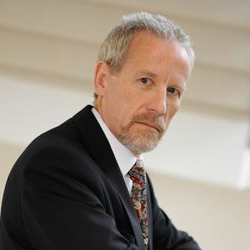
by Professor Keith Grint
- 12 October 2022
Share:
The war in Ukraine provides us with a case study in leadership that many of us would rather not have. For many in Russia, Putin’s tough and resolute leadership appears irrevocably good, both in terms of the historical narrative of addressing the national shame and nostalgic glory that embodies resonances from the old Soviet Union, and in terms of its success in “defending” Russia against the NATO-inspired Nazis that Putin alleges operate in Ukrainian uniforms. For many in Ukraine and in the West, the “same” war is regarded as a moral outrage, an unprovoked Russian attack upon a sovereign state, the type of action that most thought had disappeared from European history after 1945. Fortunately for Ukraine, Zelensky has demonstrated that, given the right situation, even an ex-comedian with little political experience can rise to the situation and provide Ukrainians with the kind of charismatic performance his fictional character in the Servant of the Nation TV series would have been proud of. But is there more to this clash of leaders and countries than yet another rehash of the romance of heroic leaders and the attritional war that has left thousands dead and wounded, millions displaced, and large swathes of eastern Ukraine devastated?
Perhaps I can start by suggesting that the clash is not just about these material elements but also about our understandings of leadership. After all, if Putin is to prevail, then the Russian people will probably judge him on the product of his leadership, rather than the process through which he achieved the result. In effect, a traditional Machiavellian approach where the ends justify the means and those ends are a consequence of Putin’s position at the top of an authoritarian state. Zelensky’s leadership, on the other hand, appears to have much more to do with his persona and the process by which he has mobilized his followers to resist the Russians. Of course, the end product, the result, is important for Zelensky too, but even when the Ukrainian army was retreating in the early part of the war, Zelensky’s popularity remained solid. In contrast, Putin’s popularity slid as the Ukrainian counter-offensive gained ground in September and early October. Both leaders are engaged in a war of words, as well as guns, especially in terms of the purpose for which their followers fight. So, unless we can unpack these various elements of leadership, it is not possible to explain why different people have radically diverse understandings of the same war.
I suggest that leadership is what Gallie (1955-56) called “an essentially contested concept.” That is, we probably disagree about the meaning of leadership, and there is probably never going to be a consensus about this. For example, it seems extremely unlikely that both sides will eventually come to a consensus about who was responsible for starting the war or which side had the moral high ground. To seek such a consensus is to assume the “facts” are objective and people are persuaded by them, but we know this is rarely the case. That does not mean we should give up trying to understand events in Ukraine or Russia, but it does mean that before we can discuss the events and hopefully find a way of ending the conflict, we need to be clear first about what we mean by “leadership.”
Reference
Gallie, W.B. (1955–56). Essentially Contested Concepts. Proceedings of the Aristotelian Society, 56, 167–98.

Keith Grint is Professor Emeritus at Warwick University. He has held Chairs at Cranfield University and Lancaster University and was Director of Research at the Saïd Business School, Oxford University. He is a Fellow of the International Leadership Association (ILA) and Professorial Fellow of the Australian Institute of Police Management (AIPM). He is also a founding co-editor with David Collinson of the journal Leadership, and co-founder of the International Studying Leadership Conference. He received ILA’s Lifetime Achievement Award in 2018. His books include The Arts of Leadership (2000); Organizational Leadership (2005); Leadership: Limits and Possibilities (2005); Leadership, Management & Command: Rethinking D-Day (2008); Leadership: A Very Short Introduction (2010); and Mutiny and Leadership (2021).

